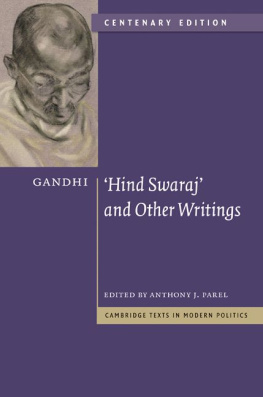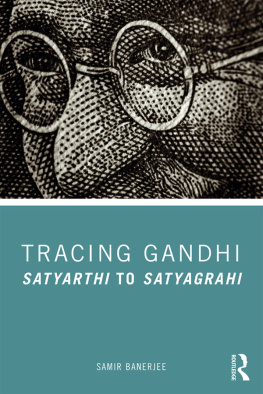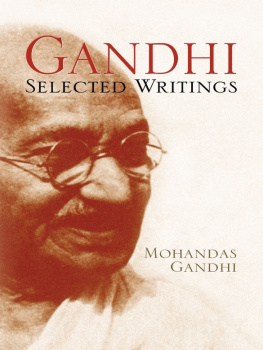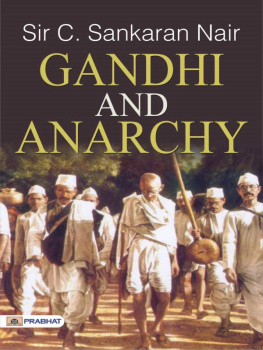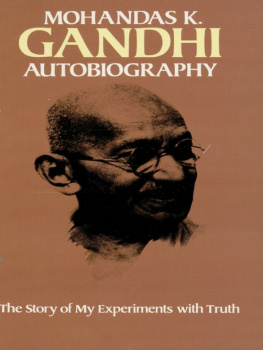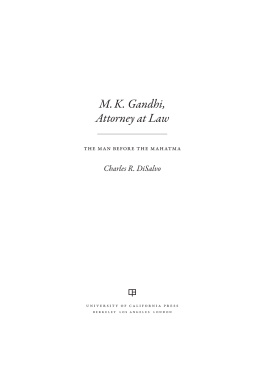Hind Swaraj or Indian Home Rule
By : M. K. Gandhi
Printed & Published by :
Jitendra T Desai
Navajivan Publishing House
Ahmedabad 380 014 (INDIA)
TO THE READER
I would like to say to the diligent reader of my writings and to others who are interested in them that I am not at all concerned with appearing to be consistent. In my search after Truth I have discarded many ideas and learnt many new things. Old as I am in age, I have no feeling that I have ceased to grow inwardly or that my growth will stop at the dissolution of the flesh. What I am concerned, with is my readiness to obey the call of Truth, my God, from moment to moment, and, therefore, when anybody finds any inconsistency between any two writings of mine, if he has still faith in my sanity, lie would do well to choose the later of the two on the same subject.
M. K. GANDHI
Harijan, 29-4-33, P . 2
PREFACE TO THE NEW EDITION
[In issuing this new edition of Hind Swaraj it may not be inappropriate to publish the following that I wrote in the Harijan in connection of the Hind Swaraj Special Number of the Aryan Path. Though Gandhiji's views as expressed in the first edition of Hind Swaraj have remained in substance unchanged, they have gone through a necessary evolution. My article copied below throws some light on this evolution. The proof copy of this edition has been revised by numerous friends to whom I am deeply indebted.
Wardha, 11-12-38
M. D.]
AN IMPORTANT PUBLICATION
Unique in its conception and beautifully successful1 in its execution is the Special Hind Swaraj Number of the Aryan Path. It owes its appearance mainly to the devoted labours of that gifted sister Shrimati Sophia Wadia who sent copies of Hind Swaraj (Indian Home Rule) to numerous friends abroad and invited the most prominent of them to express their views on the book. She had herself devoted special articles to the book and seen in it the hope for future India, but she wanted the European thinkers and writers to say that it had in it the potency to help even Europe out of its chaos, and therefore she thought of this plan. The result is remarkable. The special number contains articles by Professor Soddy, G. D. H. Cole, C. Delisle Burns, John Middleton Murry, J. D. Beresford, Hugh Fausset, Claude Houghton, Gerald Heard and Irene Rathbone. Some of these are of course well-known pacifists and socialists. One wonders what the number would have been like, if it had included in it articles by non-pacifist and non- socialist writers! The articles are so arranged "that adverse criticisms and objections raised in earlier articles are mostly answered in subsequent ones". But there are one or two criticisms which have been made practically by all the writers, and it would be worthwhile considering them here. There are certain things which it would be well to recognize at once. Thus Professor Soddy remarks that, having just returned from a visit to India, he saw little outwardly to suggest that the doctrine inculcated in the book had attained any considerable measure of success. That is quite true. Equally true is Mr G. D. H. Cole's remark that though Gandhiji is "as near as a man can be to Swaraj in a purely personal sense", "he has never solved, to his own satisfaction, the other problemthat of finding terms of collaboration that could span the gulf between man and man, between acting alone and helping others to act in accordance with their lights, which involves acting with them and as one of thembeing at once one's self and someone else, someone one's self can and must regard and criticize and attempt to value." Also as John Middleton Murry says, "the efficacy of non-violence is quickly exhausted when used as a mere technique of political pressure",when the question arises, 'Is nonviolence fante de mieux, really non-violence at all?'
But the whole process is one of endless evolution. In working for the end, man also works for perfecting the means. The principle of non-violence and love was enunciated by Buddha and Christ centuries ago. It has been applied through these centuries by individual people with success on small clear-cut issues. As it has been recognized, and as Gerald Heard has pointed out, "the world-wide and age-long interest of Mr. Gandhi's experiment lies in the fact that he has attempted to make the method work in what may be called the wholesale or national scale." The difficulties of that application are obvious, but Gandhiji trusts that they are not insurmountable. The experiment seemed impossible in India in 1921 and had to be abandoned, but what was then impossible became possible in 1930. Even now the question often arises: 'What is a nonviolent means?' It will take long practice to standardize the meaning and content of this term. But the means thereof is self-purification and more self-purification. What Western thinkers often lose sight of is that the fundamental condition of non-violence is love, and pure unselfish love is impossible without unsullied purity of mind and body.
The Attack on Machinery and Civilization
What is a common feature of all the other appreciative reviews of the book is in the reviewers' opinion Gandhiji's unwarranted condemnation of machinery. "He forgets, in the urgency of his vision," says Middleton Murry, "that the very spinning wheel he loves is also a machine, and also unnatural. On his principles it should be abolished." "This," says Prof. Delisle Burns, "is a fundamental philosophical error. It implies that we are to regard as morally evil any instrument which may be misused. But even the spinning wheel is a machine; and spectacles on the nose are mere mechanisms for 'bodily' eyesight. The plough is a machine; and the very earliest mechanisms for drawing water are themselves only the later survivals of perhaps ten thousand years of human effort to improve the lives of men.... Any mechanism may be misused; but if it is, the moral evil is in the man who misuses it, not in the mechanism." I must confess that in "the urgency of his vision" Gandhiji has used rather crude language about machinery, which if he were revising the book he would himself alter. For I am sure Gandhiji would accept all the statements I have quoted here, and he has never attributed to mechanisms moral qualities which belong to the men who use them. Thus in 1924 he used language which is reminiscent of the two writers I have just quoted. I shall reproduce a dialogue that took place in Delhi. Replying to a question whether he was against all machinery, Gandhiji said:
"How can I be when I know that even this body is a most delicate piece of machinery? The spinning wheel is a machine; a little toothpick is a machine. What I object to is the craze for machinery, not machinery as such. The craze is for what they call labour-saving machinery. Men go on 'saving labour' till thousands are without work and thrown on the open streets to die of starvation. I want to save time and labour, not for a fraction of mankind but for all. I want the concentration of wealth, not in the hands of a few, but in the hands of all. Today machinery merely helps a few to ride on the backs of millions. The impetus behind it all is not the philanthropy to save labour, but greed. It is against this constitution of things that I am fighting with all my might.... The supreme consideration is man. The machine should not tend to atrophy the limbs of, man. For instance, I would make intelligent exceptions. Take the case of the Singer's Sewing Machine. It is one of the few useful things ever invented, and there is a romance about the device itself."
"But," asked the questioner, "there would have to be a factory for making these sewing machines, and it would have to contain power-driven machinery of ordinary type."
"Yes," said Gandhiji, in reply. "But I am socialist enough to say that such factories should be nationalized, State-controlled.... The saving of the labour of the individual should be the object, and not human greed the motive. Thus, for instance, I would welcome any day a machine to straighten crooked spindles. Not that blacksmiths will cease to make spindles; they will continue to provide spindles but when the spindle goes wrong every spinner will have a machine to get it straight. Therefore replace greed by love and everything will be all right."
Next page


